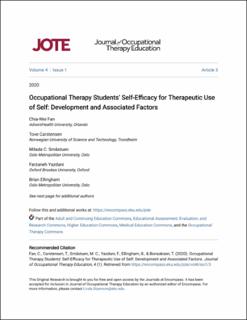Occupational therapy students’ self-efficacy for therapeutic use of self: Development and associated factors
Fan, Chia-Wei; Carstensen, Tove; Småstuen, Milada Cvancarova; Yazdani, Farzaneh; Ellingham, Brian; Bonsaksen, Tore
Peer reviewed, Journal article
Published version

Åpne
Permanent lenke
https://hdl.handle.net/11250/2651483Utgivelsesdato
2020Metadata
Vis full innførselSamlinger
Originalversjon
Journal of Occupational Therapy Education. 2020, 4 (1), 1-15. 10.26681/jote.2020.040103Sammendrag
Occupational therapy students need to develop self-efficacy for therapeutic use of self in practice. This longitudinal study examined Norwegian occupational therapy students’ self-efficacy for therapeutic use of self over a 16-month period and investigated predictors of their end-point self-efficacy. One hundred and eleven students from two universities completed a self-efficacy questionnaire related to the use of self after a workshop, and at 3-month, 10-month, and 16-month follow-up. The students’ self-efficacy development was analyzed with linear mixed effect models, while factors associated with self-efficacy were investigated with linear regressions. The students from both universities showed a linear increase in self-efficacy for therapeutic mode use (p < 0.001), recognizing clients’ interpersonal characteristics (p < 0.001), and managing interpersonal events (p < 0.001). However, for the students from University 1 the largest increase occurred in an early phase, whereas for the students from University 2 the largest increase occurred in a late phase. Only baseline scores were associated with the end-point measure at 16-month follow-up. The study indicates that students’ self-efficacy for therapeutic use of self increased during the follow-up period and adds to the knowledge about occupational therapy students’ self-efficacy development related to understanding and managing client-therapist interactions.
